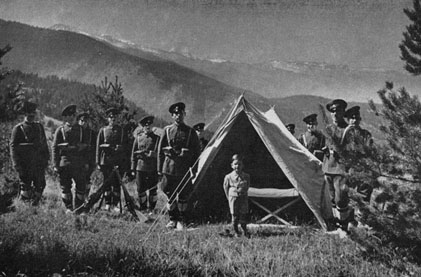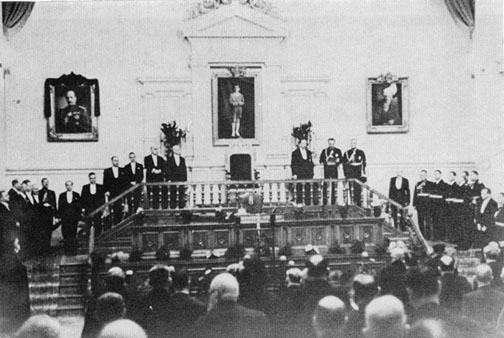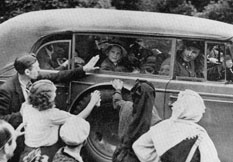
Crown Prince Simeon in the Rila Mountains, 1942
King Simeon II is the son of King Boris II and Queen Givanna, sister of King Umberto of Italy. HIs birth in Sofia on the 16th June 1937 was greeted with enormous enthusiasm by the Bulgarian people, and the title of Prince of Tirnovo--the traditional title of the Bulgarian Crown Prince was given to him. His early years were spent with his parents and elder sister, Princess Maria Louise, in the Palace of Vrana, where he also started school.

Crown Prince Simeon in the Rila Mountains, 1942
Upon his father's sudden and mysterious death on the 28th August 1943, he ascended the throne as Simeon II, King of the Bulgarians, and --in accordance with the CONSTITUTION OF TIRNOVO--a Regency Council was formed. However, the King--who had learned to read and write at a very early age--found no difficulty in understanding affairs of State, and, by the time he was seven years old, was accustomed to receive his Prime Minister and members of the Regency Council and listen to their reports. He recalls these interviews vividly "There I was, just a boy, yet acting like an adult!"
It must here be recalled that although Bulgaria had joined the Axis powers in the Second World War reluctantly, under the threat of invasion by Hitler. Bulgaria was never in war with the U.S.S.R and King Boris III continued to maintain diplomatic mission in Moscow.
The Soviet Russians were aware, however, that without the help of the Red Army it would be impossible for the Communists to seize control of Bulgaria. So although Bulgaria was anxious to make peace with the Western Allies, the U.S.S.R. declared war on her during the latter part of 1944 and the Russian Army immediately marched in.
Speaking of this dark episode King Simeon has summed it up as follows:
"I think that the Communist method of seizing power in the name of the proletariat is known to all. It involves the gamut of violent methods selected from past ages. The first step is the elimination of all parties and forces of opposition; the second step is the establishment of a left wing single party dictatorship; the third consists of the creation of an effective propaganda system in order to channel the thinking of people; and the fourth is the lowering of the "Iron Curtain" in order to isolate the people from "dangerous ideas". All this is facilitated by invasion by a foreign army, and armed uprising, the killing of the better educated sections of the community, attacks by partisans, the setting up of "People's Courts," the paying off of vendettas, confiscation of property, murder, the use of torture, detention without trial and forced labor in concentration camps."

The Bulgarian Royal Family leaving King Boris's tomb in the Rila Monastery, 1944
As soon as the Bulgarians coup d'etat had taken place, the Communists began applying these methods with grim efficiency.
The first to be brought before a mock tribunal and executed were the three Regents: King Simeon's Uncle Prince Kyril, Premier Filov and General Mihov; the former Premiers, Bozhilov and Bagrianov; the former Minister of the Interior Gabrovsky; twenty-five other Cabinet Ministers and sixty-eight Members of the Parliament. These executions were carried out in the most brutal manner. Numerous other politicians received sentences of life, or twenty years. But the "headline" trials were by no means the only ones. All over the country the Communists set up People's Courts which had power of execution without appeal. The purge was one of the bloodiest in the whole of occupied Europe, and in effect exterminated the entire intelligentsia and elite of the former regime.

Parliament proclaiming King
Simeon II, following the death of King Boris III, September 1943
(Within eighteen months
almost everyone in this photograph had been executed by the Communists)
After two years of Soviet occupation a rigged plebiscite was held on the Monarchy, and on the 16th September 1946, the King, without having abdicated, left the country accompanies by his Mother, his aunt, Princess Eudoxie, and his sister, Princess Marie Louise. They had with them a few members of their suite, and had been given in al $ 200 (two hundred) for their expenses. They sought refuge with the Queen's Father, King Victor Emmanuel of Italy, in Egypt. The years that followed were difficult ones for the Royal Family, especially financially; they have not, however, embittered King Simeon, but have served to make him realistic and philosophical about his situation.
His Majesty once said:
"If, for example, we take the French Revolution, the embryo of the new political thinking (which is still having repercussions two centuries later), if one also considers that it was carried out with only five thousand victims, what could be said for the future if we contemplate the Marxist revolution? Only comparing the victims of the former with the tens of millions of the communist revolution, and also taking into account the economic and ideological effects, it is easy to imagine the consequences for the coming generations. As I said, nobody is capable of stopping the progress of history, and this applies to the countries of the so-called "Socialist Bloc". For them there is no return, they are changing their features! Although the basic principles, the intentions and goals may remain the same, and this must not be forgotten; where is the Soviet Union of the thirties, and where is Russia today? Something similar is also happening to Bulgaria, giving new possibilities to out patriots, above all among the young ones.
"If the foregoing generations, and my own, have been harmed by Communism and the new social order, how can we, (and I say we), fall into the error of trying one day to recover the wealth which we have lost? Bulgaria and her people are much more important, and I do not doubt that all will accept this situation--our sacrifice--if it is for her good.
"I repeat and warn everyone that it will be impossible to create a new
Bulgaria with revengeful or extreme sentiments. This would mean looking
backwards, instead of forward to the future which is ours! We pursue true
policies of national union, in which all will have the opportunity to work
for Bulgaria. The great Spanish philosopher, Ortega y Gasset, said
once that any extremes in the political life of a nation are equivalent
to hemiplegia of the human organism."

King Simeon touring Bulgaria as a child in 1945